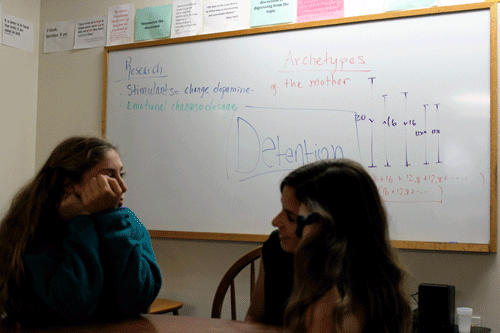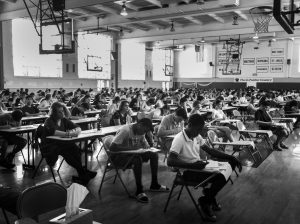Detentions fail to fulfill their purpose

Seniors sit in detention contemplating whether to do work or watch Netflix. Students raise concern over the inconsistency in the detention policy. (photo illustration)
April 25, 2017
In the past year or so, the meaning of the word detention at Masters has vastly changed. The word used to indicate students were in trouble, but now, people take it lightheartedly. Some even say they enjoy detention, using it as a method of socializing on a Friday night.
In the past, detentions were assigned to students for not doing their homework, breaking schools rules, or receiving too many dress code tickets. However, with the disappearance of the dress code, and the day students sudden ability to avoid detention for lateness, the policy surrounding detentions is rather ambiguous.
The problem is not that detentions are a bad way of disciplining kids, it’s that too many times detentions are subjective and depend on the discretion of the teacher or advisor. Some students are able to get away with not doing homework based entirely on their teacher’s feelings. Occasionally students will simply skip morning meeting to avoid having their name written down on the late list upon arrival.
Students will become more willing to do their work in the first place if the word detention actually started meaning something serious. There will be no more watching Netflix, or playing games during detentions. People will know they will have to work during them instead of just chilling with their friends.
The disconnect between teachers that give detention, and those that do not, is quite large, and is unfair to the students that are receiving detentions frequently. If detention is a punishment intended to put students on the right track, the leniency in policy at the moment is frustrating and does not work.
Teachers who hand out detentions regularly can become detention happy, dishing them out for minor things, while other teachers miss them for major infractions. The idea that students are getting detentions infrequently, and then enjoying them, goes against our schools policy of encouraging students to do their work on time and follow the rules.
For this reason the school needs to have a more exact definition of scenarios in which assigning detention is appropriate, and what teachers need to do when assigning them. For example, when a student misses a homework assignment, there should not be any leniency for that student getting a detention. If teachers become more strict with their policies, students will be able to adapt to their teacher’s work load and the entire problem will resolve itself.
Detention is a means of punishment and correction, not a fun activity for a Friday night.





















